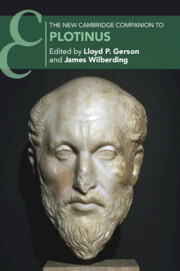145 results
Figures
-
- Book:
- The New Cambridge Companion to Plotinus
- Published online:
- 25 May 2022
- Print publication:
- 02 June 2022, pp viii-viii
-
- Chapter
- Export citation
Part IV - Natural Philosophy
-
- Book:
- The New Cambridge Companion to Plotinus
- Published online:
- 25 May 2022
- Print publication:
- 02 June 2022, pp 265-338
-
- Chapter
- Export citation
Abbreviations of Other Ancient Works and Authors
-
- Book:
- The New Cambridge Companion to Plotinus
- Published online:
- 25 May 2022
- Print publication:
- 02 June 2022, pp xvi-xxiv
-
- Chapter
- Export citation
Porphyry’s Arrangement of the Enneads
-
- Book:
- The New Cambridge Companion to Plotinus
- Published online:
- 25 May 2022
- Print publication:
- 02 June 2022, pp xiv-xv
-
- Chapter
- Export citation
Part I - Historical Context
-
- Book:
- The New Cambridge Companion to Plotinus
- Published online:
- 25 May 2022
- Print publication:
- 02 June 2022, pp 13-112
-
- Chapter
- Export citation
Tables
-
- Book:
- The New Cambridge Companion to Plotinus
- Published online:
- 25 May 2022
- Print publication:
- 02 June 2022, pp ix-ix
-
- Chapter
- Export citation
Contents
-
- Book:
- The New Cambridge Companion to Plotinus
- Published online:
- 25 May 2022
- Print publication:
- 02 June 2022, pp v-vii
-
- Chapter
- Export citation
Copyright page
-
- Book:
- The New Cambridge Companion to Plotinus
- Published online:
- 25 May 2022
- Print publication:
- 02 June 2022, pp iv-iv
-
- Chapter
- Export citation
Bibliography
-
- Book:
- The New Cambridge Companion to Plotinus
- Published online:
- 25 May 2022
- Print publication:
- 02 June 2022, pp 410-442
-
- Chapter
- Export citation
Contributors
-
- Book:
- The New Cambridge Companion to Plotinus
- Published online:
- 25 May 2022
- Print publication:
- 02 June 2022, pp x-xii
-
- Chapter
- Export citation
Index Locorum
-
- Book:
- The New Cambridge Companion to Plotinus
- Published online:
- 25 May 2022
- Print publication:
- 02 June 2022, pp 443-464
-
- Chapter
- Export citation
13 - Nature: Plotinus’ Fourth Hypostasis?
- from Part IV - Natural Philosophy
-
-
- Book:
- The New Cambridge Companion to Plotinus
- Published online:
- 25 May 2022
- Print publication:
- 02 June 2022, pp 312-338
-
- Chapter
- Export citation
Part V - Ethics
-
- Book:
- The New Cambridge Companion to Plotinus
- Published online:
- 25 May 2022
- Print publication:
- 02 June 2022, pp 339-409
-
- Chapter
- Export citation
Index
-
- Book:
- The New Cambridge Companion to Plotinus
- Published online:
- 25 May 2022
- Print publication:
- 02 June 2022, pp 465-471
-
- Chapter
- Export citation
Part II - Metaphysics and Epistemology
-
- Book:
- The New Cambridge Companion to Plotinus
- Published online:
- 25 May 2022
- Print publication:
- 02 June 2022, pp 113-216
-
- Chapter
- Export citation
Acknowledgements
-
- Book:
- The New Cambridge Companion to Plotinus
- Published online:
- 25 May 2022
- Print publication:
- 02 June 2022, pp xiii-xiii
-
- Chapter
- Export citation
Part III - Psychology
-
- Book:
- The New Cambridge Companion to Plotinus
- Published online:
- 25 May 2022
- Print publication:
- 02 June 2022, pp 217-264
-
- Chapter
- Export citation

The New Cambridge Companion to Plotinus
-
- Published online:
- 25 May 2022
- Print publication:
- 02 June 2022
Chapter 8 - Recapitulation Theory and Transcendental Morphology in Antiquity
-
-
- Book:
- Cosmology and Biology in Ancient Philosophy
- Published online:
- 21 May 2021
- Print publication:
- 10 June 2021, pp 131-151
-
- Chapter
- Export citation
6.6 (34) - On Numbers
- from 6.6 (34) - On Numbers
-
- Book:
- Plotinus: The <I>Enneads</I>
- Published online:
- 16 December 2017
- Print publication:
- 28 December 2017, pp 775-797
-
- Chapter
- Export citation



